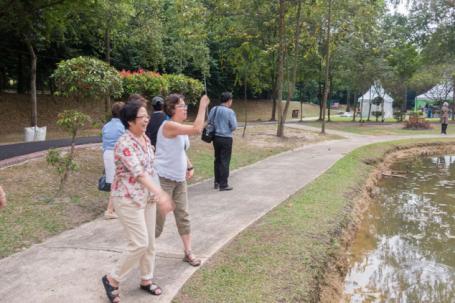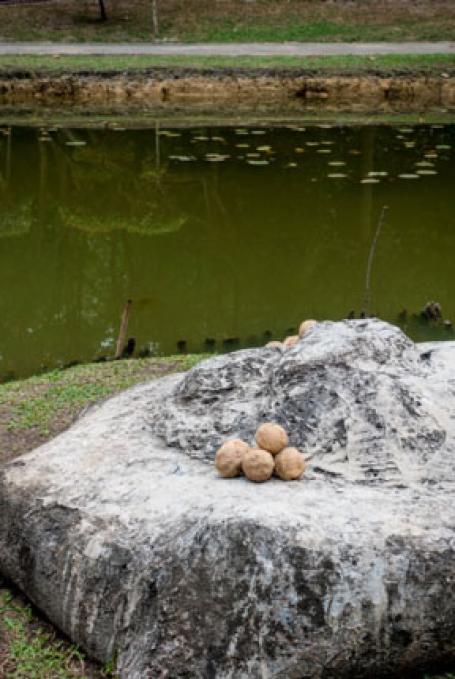


The PPSEAWA International Ambassador of Peace, Ravesi Johnston, asked PPSEAWA National Member Organizations to engage with this year’s theme: “Sustainable Development Goals: Building Blocks for Peace”, to focus on the challenges to achieving peace such as poverty, hunger, social inequality, and environmental degradation. She asked us to share what we do together, or what individuals in our group do to bring Peace to a family and in our communities.
The Chicago Chapter observed the International Day of Peace at the home of Teresa Hintzke, PPSEAWA International Immediate Past President. Teresa Hintzke, Mei Chao and Akari Yamada attended the 26th International Conference in Kuala Lumpur, Malaysia in August 2016. We each presented an environmental project for another PPSEAWA that inspired us. Our members heard about the PPSEAWA International Peace Garden in Kuala Lumpur where we participated in cleaning up a lake using enzyme-infused mud-balls thanks to PPSEAWA Malaysia. We discussed the “Rise Beyond the Reef” project in which a PPSEAWA Fiji member highlighted in her panel presentation, to provide sustainable income-generation projects for rural women to connect them to the cities and outside world using recycled materials from the cities.
Other members shared their environmental projects and concerns. We all feel that a peaceful society must be an inclusive society, where resources are shared more fairly and we don’t lightly discard that which we don’t want. One of our members asked us to examine what we do with clothes we don’t wear anymore…
According to the Environmental Protection Agency, 68-80 pounds of clothing per man, woman, or child, actually end up in American landfills each year. In short 85% of clothing ends up in landfills even though 95% could be reused and recycled! Our member tries to donate old clothes but was appalled to find put that the U.S. exports secondhand clothing overseas at just pennies per pound, which is then sometimes sold on the black market or incinerated (methane gas can be recaptured as energy).
1. Our chapter decided to raise awareness of TEXTILE RECYCLING (also known as Closed Loop Textile Recycling). Secondhand clothing can be separated into three groups: 45% can be re-worn or used for home insulation, 20% can be broken down and converted into fibers which are the raw materials for making new clothes, and 30% become wiping cloths.
Since 2013, some apparel companies have been working with the I:CO. The I:CO or I-Collect is a provider for clothing and shoes reuse and recycling with offices in Germany, the United Kingdom, United States and Japan. I:CO aims to keep consumers’ clothing and shoes in a closed loop production cycle where these goods can be reprocessed and reused again and again. Buy from and donate to these companies that have used clothing recycling programs:
- American Eagle Outfitters accepts used jeans, clothing, and shoes for donation in any store. The customers will then be rewarded with a text code for $5 off a pair of AE jeans to be used in the store that day. For example, used denim becomes the insulation for solar-powered homes built by the nonprofit Make It Right.
- H & M accepts clothing from any brand and in any condition at local stores (Michigan Avenue, Northbrook Court, Woodfield Mall, Gurnee Mills). In return, the customer will receive a voucher for each bag brought, up to 2 per day.
- Levi’s accepts used clothing and shoes for recycling at all US stores (Michigan Avenue store, Woodfield Mall store, outlet at Gurnee Mills). Any consumer who brings an item of clothing to recycle will receive a voucher for 20 percent off a single, regular-priced
- The North Face has bins to accept used apparel and footwear (any condition, any brand) at their retail stores (Old Orchard mall) so customers can an earn a $10 reward toward next purchase of $100 or more at The North Face.
2. Here is a brief list of local charities to donate to that service clients directly, especially low- income families and low-income professionals:
- Dress for Success in Chicago accepts ready-to-wear professional women’s clothing and accessories for distribution to low-income women to help them gain employment. See website for donation days and wish list at www.dressforsuccess.org
- In-kind donations of gently used men’s clothing, socks, winter coats, hats and gloves are accepted at Hilda’s Place Shelter for the Homeless, 1458 Chicago Ave. in Evanston, 6-9 PM any night of the week.
- ESCCA (Evanston School Children’s Clothing Association) provides clothing for all school children in need in Evanston/Skokie District 65 (about 650 per year). See escca.org. You can also bring gently used children’s clothing and winter coats to the drop-off bin outside the District 65 Administration Bldg., 1500 McDaniel, Evanston (located on the west side of the building) – especially need boys sizes 10-18.
- The Glass Slipper Project in Chicago and The Dreams Delivered program by the Woman’s Club of Evanston provides new and gently used prom dresses to high school students for free. They need donations of formal wear sizes 0 - 24.
3. Consider buying secondhand clothing and household goods… the best thrift stores in Chicago are highlighted at www.timeout.com/chicago/shopping/the-best-thrift-stores-in-chicago-for-… .
To conclude, one of our UN Representatives, Kesinee Dulyarat sent these words of wisdom from the sixth century Chinese Philosopher, Loa Tzu -
If there is to be Peace in the world,
There must be Peace in the Nations.If there is to be Peace in the Nations,
There must be Peace in the Cities.If there is to be Peace in the Cities,
There must be Peace in the Neighbors.If there is to be Peace in the Neighbors,
There must be Peace in the Home.If there is to be Peace in the Home,
There must be Peace in your Heart.
Peace be with You all!
